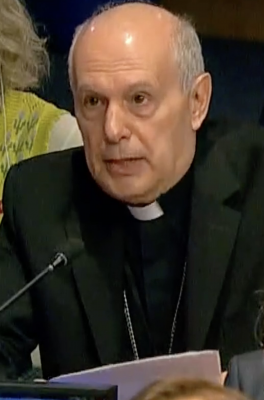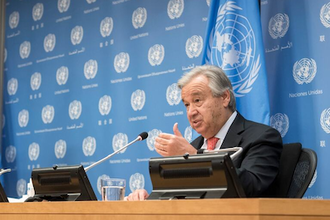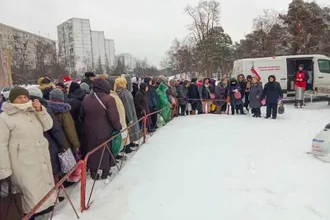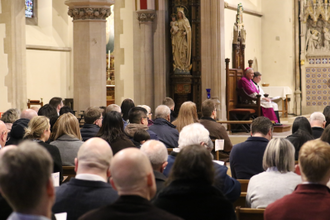Famine and Conflict-Induced Global Food Insecurity

Archbishop Gabriele Caccia, Credit: Vatican News
Source: Holy See to the United Nations
On 3 August 2023, Archbishop Gabriele Caccia, Permanent Observer of the Holy See to the United Nations in New York, delivered a statement at the United Nations Security Council's open debate on 'Famine and Conflict-Induced Global Food Insecurity'.
The Holy See delegation recalled that every human person has the right to food, while highlighting that over a quarter of a billion people currently face high levels of acute food insecurity worldwide. In light of this, Archbishop Caccia stressed the need for responsible multilateral cooperation that generates proactive solidarity with those who hunger.
In furtherance of this, the Holy See urged all parties to return to dialogue regarding the renewal of the Black Sea Initiative, stressed the need to ensure that economic sanctions avoid negative effects on food security at the local and global levels, and called on all countries to protect our common home from climate change, in part due to its effects on local food systems.
Full statement:
The Delegation of the Holy See thanks the United States of America for convening this open debate on famine and food insecurity, an issue that has tragically become more prominent since the escalation of the war in Ukraine.
From the outset, it is important to recall that every human person has the right to "the means necessary for the proper development of life, particularly food" (Pacem in Terris, 1963). Despite this, over a quarter of a billion people currently face high levels of acute food insecurity and depend on assistance in nearly a third of States.
The present situation necessitates responsible multilateral cooperation that generates proactive solidarity with our brothers and sisters who face hunger. This requires all States to place efforts to meet basic human needs above partisan interests and to avoid treating foodstuffs as mere commodities to be awarded to the highest bidder.
In this regard, my Delegation would like to stress three points:
First: The Holy See urges all parties to return to dialogue regarding the renewal of the Black Sea Initiative in the interest of all persons who rely upon food imports. Furthermore, my Delegation calls for the cessation of attacks upon the means of transportation, essential to the supply of agricultural products, food and other basic necessities crucial to the survival of civilian populations.
Second: The Holy See stresses the need to ensure that economic sanctions avoid any negative effects they might have on both local and global food security or on the distribution of humanitarian aid.
Third: The Holy See calls all States to protect our common home created and entrusted to us by God and to take urgent action to fight climate change whose ravages, such as extreme weather events, have an impact on local food systems and can increase the risk of conflicts.
In closing, my Delegation reiterates the need for all States to adopt an integral approach to security as a means to alleviate global food insecurity, which constitutes "a serious affront to human dignity" (Pope Francis 1 July 2023).


















